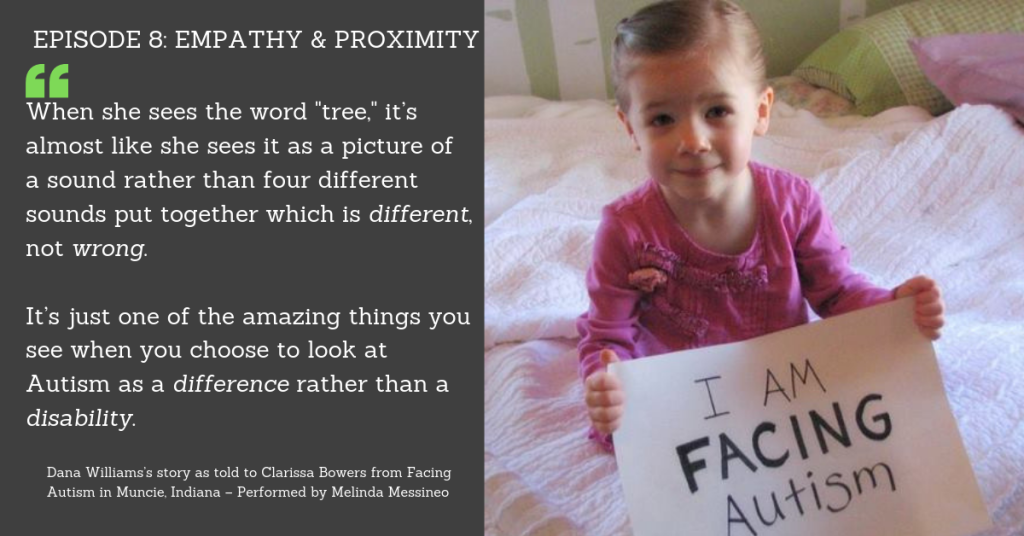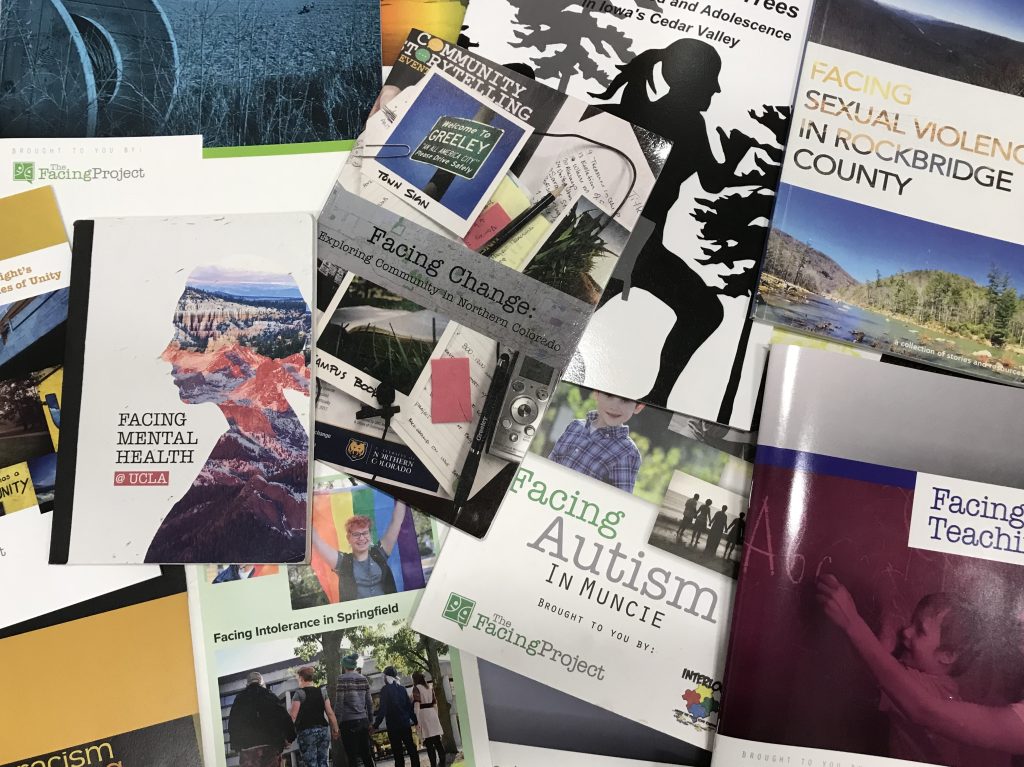A mom asks people to see her daughter with autism for who she is on Episode 8 of The Facing Project.
The stats:
According to the CDC 1 in 59 children are diagnosed with autism.
Ask
Dana’s Story
As told to Clarissa Bowers from Facing Autism in Muncie, Indiana –Performed by Melinda Messineo
Ask. Ask why she doesn’t always make eye contact. Ask why she doesn’t scream when a spider scampers across her dinner plate, like most any person would. Ask why she sometimes repeats every word you say. It’s echolalia in case you were curious.
Please don’t just look at me and think, “What’s wrong with that child?”
I assure you there is nothing wrong with her. Stella is the funniest, most interesting person I have ever met and she’s only three years old.
Every single day with Stella is a joy, an adventure, and a challenge that I am eager to meet . . . but not a challenge in the way you might think. Each day I am faced with the task of expanding my own mind so that I can see the world around me in the way that she does.
As just one example of the amazing ways my world view has changed: Stella sees words as sounds, not individual letters with individual sounds like T-R-E-E. When she sees the word tree, it’s almost like she sees it as a picture of a sound rather than four different sounds put together which is “different,” not “wrong.” Imagine a world where you are consistently being challenged to see the world through a child’s eyes.
I’ll let you in on a secret . . . it’s amazing.
It’s just one of the amazing things you see when you choose to look at Autism as a difference rather than a disability.
In recent years, people have really been emphasizing the idea of tolerance and acceptance when it comes to race, sexuality, and religion. The increase in bullying among school age kids has prompted parents to rally around their kids and raise them to be proud of their individuality . . . but for some reason developmental disorders have remained attached to their negative stigmas. Whose disorder is Stella’s autism? Hers? Or ours?
Isn’t it our responsibility as parents to get to know our own child and figure out what works best for her in terms of how she learns? Author Paul Collins said, “Autists are the ultimate square pegs, and the problem with pounding a square peg into a round hole is not that the hammering is hard work; it’s that you’re destroying the peg.”
When I tell people Stella has autism, their response is often, “I’m sorry.” A hush tends to fall over the conversation, and suddenly every bit of eye contact is tainted with a hint of sadness.
I’m not sorry, and I’m not sad.
Nothing bad happened to Stella the day she was diagnosed. She remained the same as she had always been. I felt sad when I heard that my child may struggle, but my worry never came from a place of regret or bitterness towards autism, it was simply that I feared we wouldn’t be able to understand each other.
In the seven months since her diagnosis, it has become apparent that while there are many things in the world neither of us will ever understand—we understand each other.
What parent doesn’t fear the struggles their child will face? I consider myself lucky to have a child with struggles that can be identified. I am grateful that we have proven ways to help her.
What many people see on the outside as a struggle, I see as a blessing—my beautiful girl who’s everyday successes never go unnoticed.
I’ve been given the opportunity to work with amazing professionals that spend their entire day helping Stella communicate effectively, and helping me understand her. Isn’t that kind of a gift?
Yes there are trials that come with having a child with Autism, but there are also amazing triumphs to celebrate. And we spend a lot of time celebrating Stella! Some days will be good and some days will be bad; it’s a fact of life not exclusive to autism.
If I could make three wishes for Stella’s future, it wouldn’t be for a cure or a magic drug to take away her unique traits that came with her autism. My first wish would be for Stella to find her perfect stride, marching to her own drummer. My second wish would be for people to express their curiosity with their words rather than their sideways glances. And my third wish would, of course, be for more wishes.
Stella is my child, and she should be known as a whole, unique, funny, fearless, beautiful child and not a disability or a disorder.
What is The Facing Project?
The Facing Project’s mission is to create a more understanding world through stories that inspire action. Inspired to get involved after reading this story? Here’s how you can help.
DONATE: Your donation will help support storytelling projects around the country. On average a $10 donation helps produce one story like the one you just read, and a donation of $200 can help help us support an entire community project.
GET INVOLVED: Learn how you can start a Facing Project in your community.
SUBMIT A STORY: Are you ready to share your story? Are you ready to help someone share theirs? It’s easier than ever to contribute to The Facing Project.
JOIN THE CONVERSATION: Share this post with someone who needs to hear the story, and continue the conversation on our Facebook Group, where we discuss each episode of The Facing Project Show.



